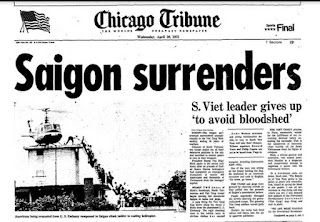Week 7
Prabhjit S Mann
ASA 150
In this week’s reading from the “The War after the War”
written by Nayan Chanda, the author highlights how even after the Vietnam was over
& the fall of Saigon, it triggered several small wars that were called the Indochina
wars. It is interesting to note that both the Soviet’s & Chinese were
involved in Vietnam and tried to have their own influence in the region, as the
Soviets did in the North & Chinese in the South. After the United States
Army fled Vietnam, disputes arose over small islands in the region to who would
claim them as their own territory, which involved Vietnam, Cambodia, China Laos
or the Soviets. Cambodia, Vietnam, and China suspended much of their internal
disputes in order to resist foreign domination during wartime. But once the war
was over their rivalry became publicized. There was no more need to be unified,
which brought them to battlefield for the self-claimed territory on island
territories. The Americans had left & didn’t turn back to look at the
region or try to help it grow in the initial years after their defeat. Something
that was ironic about the whole Vietnam War was the fact that more than just
the United States it was China who lost the Vietnam War, according to
Chanda. After the war ended Vietnam came out as a strong, reunified
Vietnam challenging China from the south. Chanda gives a different
perspective as most believed that Vietnam and China were allies with a similar
communist goal, but not in a way that China would like. The power in
Indochina came at a time when Peking was obsessed with Soviet “social
imperialist”. This gave China the fear that Moscow, one of Vietnam’s
principle supplier of military hardware, would join in the mix of the power
vacuum after the United States just left. After Operation Frequent Wind
was over the Soviets presence in the south of Vietnam as a way to heighten
vigilance “against the dangers of social-imperialist aggression and expansion. From
reading these extracts this week something that came up to my mind the connects
to the present day situation is the Iraq war as around 2012 the U.S. army
decides to pack up and leave the country, after almost of 10 years of war. They
just pack up and leave, not realizing they have completed ruined the country
killed thousands of people and displaced millions. There was no one left in
charge no healing process war started. That led the country vunerable and open
for the taking in which ISIS rose. I feel a similar situation had occurred in
Vietnam as when the U.S. left, the Chinese & Soviets were trying to control
& have their influence in the region.
Question – Would Vietnam been able to rally together as a strong
& unified nation if someone was left in power after the end of the war?
http://www.scoopnest.com/user/chicagotribune/593807954580742144

No comments:
Post a Comment